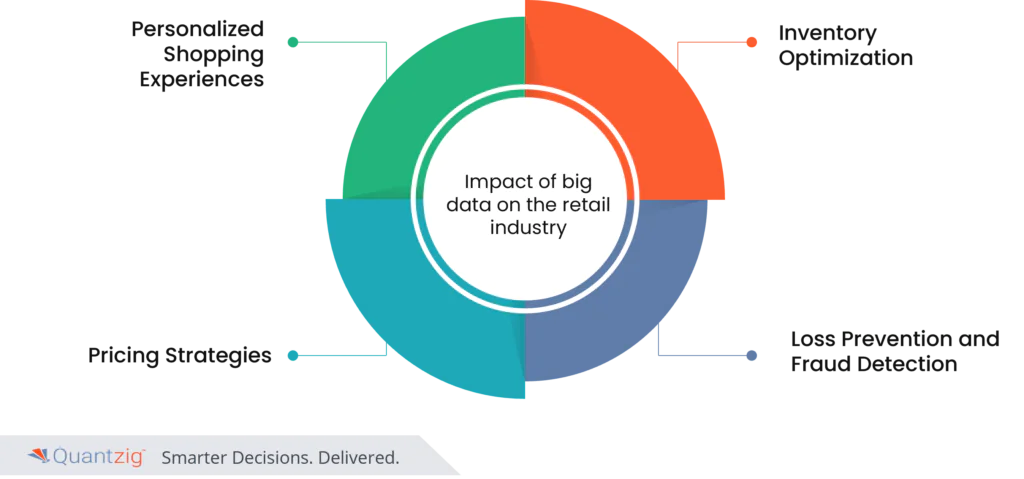Table of Contents
Overview of Big Data Analytics Solutions:
In the age of information, big data analytics has emerged as a game-changer for various industries, with supermarkets being at the forefront of this revolution. By harnessing vast amounts of data generated through customer interactions, transactions, and supply chain processes, supermarkets can significantly enhance the shopping experience. This blog delves deeper into how food and beverage analytics solutions are transforming supermarkets, exploring specific applications, benefits, challenges, and future trends.
Book a demo to experience the meaningful insights we derive from data through our ai capacity planning analytical tools and platform capabilities.
Request a Free DemoWhat are big data analytics solution?
Big data analytics solutions help organizations process and analyze large volumes of structured and unstructured data to uncover hidden patterns, correlations, and insights for better decision-making. These solutions empower businesses to optimize operations, enhance customer experiences, and drive innovation.
Key Features:
- Advanced Data Processing: Handle massive datasets in real-time.
- Predictive Analytics: Forecast trends and identify potential risks.
- Data Visualization: Present complex data insights through interactive dashboards.
- Scalability: Seamlessly adapt to growing data volumes.
- AI and Machine Learning Integration: Enable smarter, automated decision-making.
Understanding Big Data in Supermarkets
Big data encompasses the massive volumes of structured and unstructured data generated daily. For supermarkets, this includes:
- Transaction Data: Details about what customers purchase, when they shop, and payment methods.
- Customer Profiles: Information from loyalty programs that track preferences and shopping habits.
- Inventory Data: Real-time information on stock levels and product turnover rates.
- Supplier Information: Data regarding supplier performance, delivery times, and pricing.
- Social Media Interactions: Customer feedback and sentiment analysis from platforms like Twitter and Instagram.
The ability to collect, analyze, and interpret this data allows supermarkets to make informed decisions that enhance customer satisfaction and operational efficiency.
Key Areas Where Big Data Analytics is Impacting Supermarkets
1. Personalized Marketing and Promotions
Personalization is a powerful tool in retail marketing. Big data analytics enables supermarkets to create tailored marketing strategies that resonate with individual customers.
| Strategy | Example | Impact |
|---|---|---|
| Targeted Offers | A supermarket can analyze a customer’s purchase history to identify frequently bought items. If a customer regularly buys organic products, the supermarket can send personalized coupons for organic brands or related items. | Increases the likelihood of conversion as customers feel valued and understood. |
| Dynamic Pricing | Utilizing real-time analytics, a supermarket can adjust prices based on demand fluctuations. For example, if a product is nearing its expiration date, it can be discounted to encourage quick sales. | Helps in managing inventory while offering customers attractive deals. |
2. Enhanced Customer Experience
Creating an enjoyable shopping experience is crucial for customer retention. Big data analytics facilitates various enhancements:
| Aspect | Example | Impact |
|---|---|---|
| Store Layout Optimization | By analyzing foot traffic patterns through heat maps generated from customer movement data, supermarkets can rearrange product placements to maximize visibility. | Strategic placements can lead to impulse buys and increased sales of high-margin products. |
| Inventory Management | Advanced predictive analytics can forecast demand for seasonal items like holiday decorations or summer beverages based on historical sales data combined with external factors (e.g., weather forecasts). | This ensures that popular items are always stocked while minimizing waste from overstocked items. |
3. Improved Supply Chain Efficiency
A well-optimized supply chain is vital for supermarket operations. Big data analytics plays a key role in enhancing supply chain management:
| Topic | Example | Impact |
|---|---|---|
| Demand Forecasting | By analyzing past sales data alongside variables such as local events (e.g., sports games) or economic indicators (e.g., unemployment rates), supermarkets can better predict which products will be in demand. | Accurate forecasting leads to more efficient ordering processes, reducing costs associated with excess inventory or stockouts. |
| Supplier Performance Analysis | Supermarkets can use analytics to evaluate supplier reliability by tracking delivery times and product quality over time. | This enables them to make informed decisions about supplier partnerships, ensuring timely deliveries of quality products. |
4. Customer Insights and Behavior Analysis
Understanding customer behavior is essential for tailoring offerings effectively:
| Analysis Type | Example | Impact |
|---|---|---|
| Segmentation Analysis | Supermarkets segment their customer base by demographics (age, income) and purchasing behavior (frequency of visits, basket size). | Enables targeted marketing campaigns, such as promotions tailored for families versus singles. |
| Sentiment Analysis | Supermarkets use natural language processing (NLP) to analyze social media mentions and online reviews. | Allows for quick responses to negative feedback and leveraging positive trends to boost brand loyalty. |
5. Omni-channel Integration
As consumers increasingly engage across multiple shopping channels, big data analytics helps create a seamless experience:
| Category | Example | Impact |
|---|---|---|
| Unified Customer Profiles | Integrating online shopping data with in-store purchases allows supermarkets to create comprehensive customer profiles that track behaviors across platforms. | This consistency enables personalized marketing efforts regardless of how customers choose to shop. |
| Click-and-Collect Services | Customers can order groceries online and pick them up at their convenience. Data analytics ensures that the right products are available for quick pickup. | This convenience enhances customer satisfaction while driving additional foot traffic into stores. |
Challenges in Implementing Big Data Solutions
While the benefits of big data analytics are substantial, there are challenges that supermarkets must navigate:
Data Privacy Concerns
As supermarkets collect more personal information from customers, they must prioritize data privacy:
- Compliance with regulations such as GDPR (General Data Protection Regulation) is essential.
- Implementing robust security measures protects sensitive information from breaches.
Integration Complexity
Integrating new big data solutions with existing systems can be daunting:
- Supermarkets need a strategic approach to ensure seamless integration without disrupting operations.
- Investing in scalable technology solutions can mitigate integration challenges.
Skill Gaps
There is often a shortage of professionals skilled in data analysis:
- Supermarkets may need to invest in training existing staff or hire new talent with expertise in big data analytics tools.
- Collaborating with technology partners can also bridge skill gaps effectively.
Experience the advantages firsthand by testing a customized complimentary pilot designed to address your specific capacity planning requirements. Pilot studies are non-committal in nature.
Request a free pilotUses of Big Data in the Food and Beverage Industry
Inventory Analysis
- Insight: Big data identifies the most profitable products beyond popularity and price, optimizes stock levels, and predicts restocking needs.
- Impact: Reduces waste, prevents empty shelves, and minimizes overstock, especially for perishable goods.
Customer Loyalty
- Insight: Loyalty programs and data analysis collect data and to use it effectively to provide detailed customer preferences and buying patterns.
- Impact: Enables targeted promotions, improves timing of offers, and identifies customer shifts to competitors.
Impact of Big Data on the Retail Industry

Personalized Shopping Experiences
- Insight: Analyzes customer data to offer tailored recommendations and marketing.
- Impact: Enhances customer engagement and loyalty.
Inventory Optimization
- Insight: Analyzes sales trends and supplier performance to manage inventory.
- Impact: Reduces overstock and understock issues, cutting costs and boosting revenue.
Pricing Strategies
- Insight: Uses data to adjust prices based on competition, demand, and behavior.
- Impact: Maximizes profits and supports targeted promotions.
Loss Prevention and Fraud Detection
- Insight: Analyzes transaction and surveillance data to detect anomalies.
- Impact: Prevents theft and fraud, improving security.
Future Trends in Big Data Analytics for Supermarkets
The future holds exciting possibilities for big data analytics in supermarkets:
Artificial Intelligence (AI) Integration
AI algorithms will increasingly be used alongside big data analytics to enhance decision-making processes:
- Predictive analytics powered by AI will offer even more accurate demand forecasting and personalized recommendations.
Real-time Analytics
As technology evolves, real-time analytics will become more prevalent:
- Supermarkets will leverage real-time insights to make immediate adjustments in pricing strategies or inventory management based on current shopping trends.
Enhanced Customer Engagement through IoT
The Internet of Things (IoT) will play a significant role in gathering real-time data:
- Smart shelves equipped with sensors can provide insights into inventory levels while tracking customer interactions within stores.
Conclusion
Big data analytics services are fundamentally transforming the supermarket shopping experience by enabling personalized marketing, enhancing customer experiences, improving supply chain efficiency, providing deep customer insights, and facilitating omni-channel integration. By approaching food and beverage analytics with specific goals in mind, it is possible to gain many useful insights and find many ways to make your business more profitable.
As technology continues to evolve, supermarkets that effectively harness the power of big data will not only meet but exceed customer expectations in an increasingly competitive landscape. The future of retail lies in understanding customers better than ever before—an endeavor made possible through innovative big data analytics solutions. Embracing these changes will not only drive profitability but also foster long-term relationships with customers who feel valued and understood.
Get started with your complimentary trial today and delve into our platform without any obligations. Explore our wide range of customized, consumption driven analytical solutions services built across the analytical maturity levels.
Start your Free Trial



